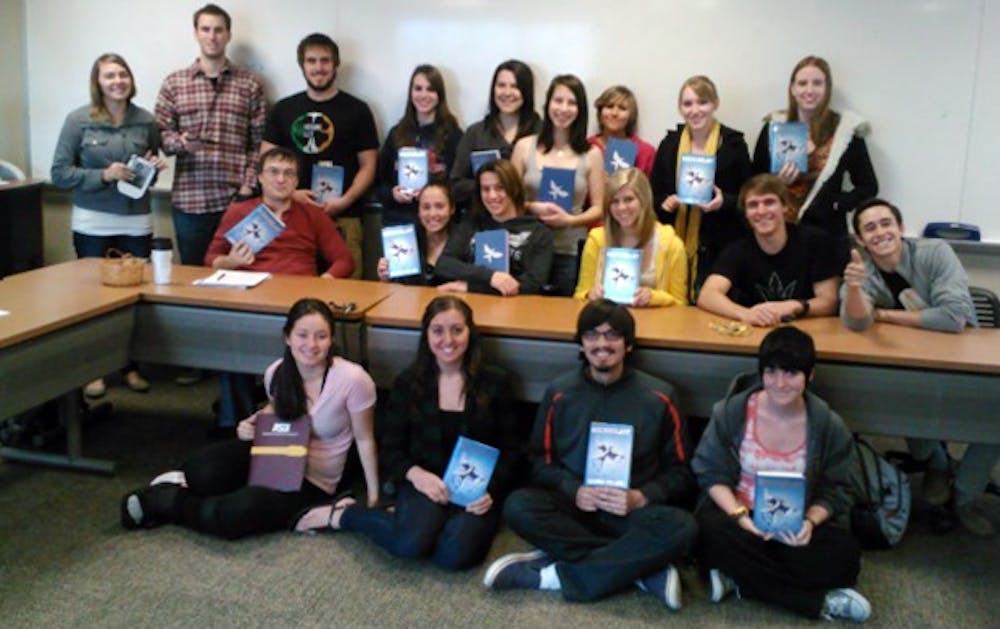The dystopian future depicted in “The Hunger Games” has started taking over campus. No, students haven’t been sent out to a battlefield in a last-one-out-alive scenario – but they are learning a little more about that situation.
The aptly named professor Joel Hunter has already taught a class on the “Harry Potter” saga, but this is the first semester he’s taught a course on “The Hunger Games,” the best-selling trilogy of young adult novels by Suzanne Collins. The books revolve around a fictional country called Panem, run by an oppressive government known as The Capitol. The country is divided into twelve districts and each year a boy and girl are picked from each district to compete in “The Hunger Games,” a free-for-all battle where only one person can survive. “The Hunger Games” class at ASU goes into deep conversations on topics explored in the books.
“I hope my students will gain an appreciation for the power of imaginative fiction, in this case literary satire, to level a devastating critique of contemporary attitudes, values and practices regarding entertainment, war, the media and affluence. I hope they learn how and why it has this power. I hope they learn that social injustices and other harms done to people – those things that make us respond, ‘It's not supposed to be this way,’ are often complex and deep-rooted in history and structures of power, and that successful challenges to them require courage, personal integrity, perseverance, community, and sacrifice,” Hunter says. He hopes the students learn the deeper meanings that lurk below the surface in “The Hunger Games”: the literary, historical and cultural motifs.
In the beginning of each class Hunter brings a quarter (a coin is a prominent symbol in the books) and the students have their own version of “The Hunger Games.”
“We're holding our own in-class “Hunger Games,” where the students are divided up into “districts.” Someone's name is chosen from a bowl and they have to answer a trivia question posed by students from one of the other districts. The plan is for the winner of our ‘Hunger Games’ to win a beginner's course in archery,” Hunter says.
Sitting back and watching how this class functions was a unique experience. Participation is key to that atmosphere: it’s not a lecture so much as an informed discussion. Out of a class of 18 students, nearly everyone commented and pitched in their two cents.
“You learn so much more when you are talking about things you are reading about. It really is a great class. I always want to jump ahead and read more than what is assigned,” says Allison Miller, a sustainability and women and gender studies senior. “But what makes a class like this so amazing is you need to have good content and a good facilitator, which we have.”
The class is on the third novel, “Mockingjay.” The class’s discussions are in-depth, done chapter by chapter. They even talk in Hunger Game lingo: “Who has a tribute today?” They discuss the parts they enjoyed (“My favorite, I could read over and over again was … ”) or they offer some spirited debate: “No it is not an illusion; you need to read between the lines!”
Saying they’re enthusiastic would be a huge understatement. So far, from Hunter’s perspective, the class has discovered some major (and majorly unexpected) threads of discussion. Here are a few highlights:
1) The history of events leading up to the Third Punic War between Rome and Carthage and how these are mirrored in “The Hunger Games.”
2) The realization that Suzanne Collins was critiquing the current middle-class American way of life – its obsession with celebrity culture and reality television, self-centeredness, numbness to violence and extravagance with food and resources – and its possible effects on the poor and vulnerable both here and abroad.
3) The potency of protest and rebellion folk ballads. (“Mockingjay” has a great one: "The Hanging Tree").
Students were eager to sign up before the class kicked off, and their enjoyment of the class now is overwhelming.
“I love to read! It just makes it more entertaining dissecting a book with other people. This is a really fun class for me – it’s like you are thinking but really without thinking about it,” says Lea Murray, a sophomore in plant biology. Hunter is hoping to teach more “Hunger Games” classes at ASU and is eager to see the movies as well. (Interviews with Hunter and students were conducted before the recent release of the first movie.)
“As the movies are released, they'll bring in millions more readers – hurrah! – who will get the particular kind of imaginative experience that only comes from encountering the story on the printed page,” Hunter says. “I expect this will occasion a raft of secondary literature to catch the popularity wave the movies unleash. I'll want to incorporate the best research from that into the course, as well as develop successful themes from this course even further.”
Contact reporter @cnnavarr@asu.edu





